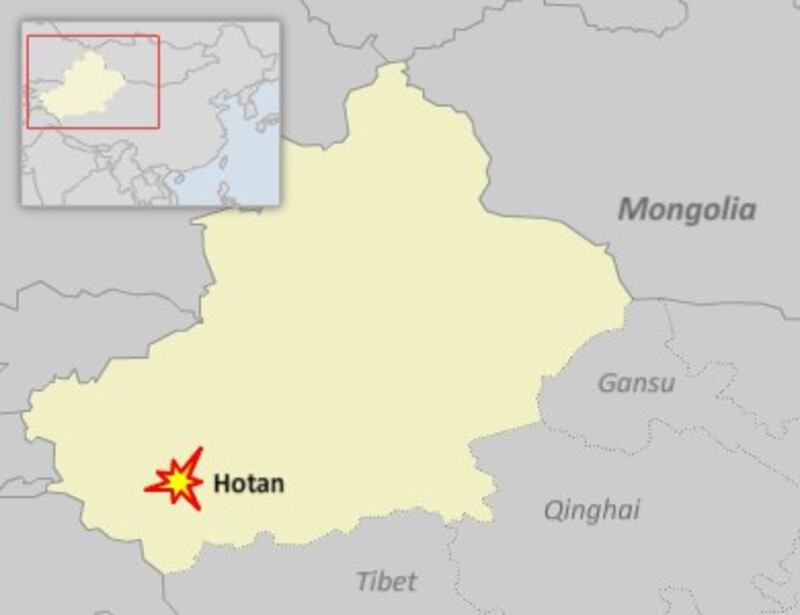An ethnic minority leader in exile has called on authorities to end injustices against Uyghurs in northwestern China to prevent further violence following Monday’s assault on a police station that left about 20 dead.
Responding to Beijing’s claims that the violence in the Xinjiang Uyghur Autonomous Region’s Hotan city was the work of “terrorists,” Rebiya Kadeer said the Chinese authorities should reassess their policies rather than blame others for the ethnic unrest.
“Just look at your own system and policies,” she said two days after the worst violence in Xinjiang in about a year.
The U.S.-based Kadeer charged that discriminatory policies against Uyghurs, including unfair exploitation of natural resources, encouragement of Han Chinese immigration, and restrictive state security measures, had contributed to ethnic tensions in the region ahead of the Monday attack.
“China has no right to label the violence ‘terrorist attacks’ unless they allow freedom of speech and assembly for their citizens,” she said.
“At the very least, China must end its practice of arbitrary detention, unjust execution, and torture in jails.”
State media said Wednesday that 14 of the 18 attackers armed with knives and Molotov cocktails were shot dead by police to end the standoff in the Nurbak area in the remote Silk Road city of Hotan. The remaining four were detained.
Kadeer said the attackers were driven by desperation, knowing they faced heavily armed police.
“Why would the attackers choose this approach when they knew what they were going to face? No human being can be silenced when they are facing death. They are willing to do anything it takes when they have lost all hope for their future,” she said.
“They don’t have rights, they don’t have jobs, and they don’t have money, so they don’t see themselves as having anything to lose.”

Official response
China’s state-run media said 18 Uyghur “religious extremists” besieged the police station in the seat of Hotan county, took hostages, and set fire to the building.
The Xinjiang government news website and the official Xinhua news agency said among those killed in the raid were an armed policeman, a security guard, a woman, and a teenage girl.
Police chief Enver Zakir from the Ilchi police station said that some of the attackers were from Kashgar city in Hotan’s neighboring Kashgar prefecture and that checkpoints have been established along all roads between the two cities.
Xinjiang, where many Muslim Uyghurs chafe under Chinese rule, is no stranger to ethnic conflict. Deadly riots in the regional capital of Urumqi left at least 200 dead in July 2009.
On Wednesday, Xinjiang regional government spokeswoman Hou Hanmin told the Associated Press that a number of "religious extremists" had traveled to Hotan on Saturday to prepare the attack, purchasing knives and materials for explosives.
An investigation into the attack is under way.
Motivated to violence
The Munich-based World Uyghur Congress said Monday that the attack was provoked by police who had clashed with a group of Uyghurs involved in a land protest earlier that day.
According to Dilxat Raxit, spokesman for the group, more than 100 Uyghur protesters were demonstrating against the seizure of their land and to demand information about relatives who had "disappeared" in a region-wide security crackdown since the Urumqi riots of 2009.
But two Uyghur residents of Kashgar prefecture said Monday’s siege of the police station was a response to an earlier raid by authorities on a group of Muslim worshippers.
“The government’s attitude toward religious activities is too harsh,” one of the two men, who asked to remain anonymous, told RFA in a phone interview.
“The scarves of the women are forcibly removed, men wearing beards are accused of displaying a symbol of their political stance against the State, and the reading and teaching of religious books is considered criminal, so many teenagers and adults were arrested for these reasons,” he said.
One of those who escaped the raid in Kashgar prefecture was arrested following the attack on the police station, according to the other man.
Uyghurs say they have long suffered ethnic discrimination, oppressive religious controls, and continued poverty and joblessness despite China's ambitious plans to develop its vast northwestern frontier.
Chinese authorities blame Uyghur separatists for a series of deadly attacks in recent years and accuse one group in particular of maintaining links to the Al-Qaeda terrorist network.
Reported and translated by Shohret Hohshur for RFA’s Uyghur service. Written in English by Joshua Lipes.
